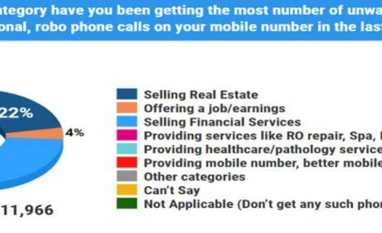While there seems to have been some impact of telecom regulator Trai's directive on pesky calls to banks, insurance companies and other commercial entities, at least 60 per cent of Indians are still receiving three or more spam calls on average daily and the majority of calls are from companies selling real estate and financial services, revealed a survey by LocalCircles.
The survey received over 60,000 responses from citizens located in 378 districts of India.
The Department of Consumer Affairs (DoCA) has constituted a committee comprising members of different regulatory authorities, telemarketing companies and cellular industry to draft the guidelines to address the issue of pesky calls.At a meeting convened by DoCA Secretary Rohit Kumar Singh on February 13, representatives from the Department of Telecom, Telecom Regulatory Authority of India, Cellular Operators Association of India, BSNL, Vodafone, Airtel and Reliance were informed about various troubling trends.
This move by DoCA follows the government’s earlier steps to protect the consumer through the new Indian Telecommunications Bill, 2023, which was passed by the Parliament in December 2023, replacing the century-old telecom law. The new legislation has provisions to reform the regulatory structure to make the sector more investor-friendly. The key provisions in the Bill aim to protect telecom users, by making impersonation and fraudulent SIM acquisition using someone else's identity proof for telecom services punishable by imprisonment for up to three years and a fine of up to Rs 50 lakh.
The law also includes comparable harsh provisions for phone number spoofing to combat fraud and a "digital-by-design" online grievance redressal mechanism to address consumer complaints. It also aims to tighten the noose around pesky calls through a variety of measures, including monitoring SIM card misuse.
A comparative study by LocalCircles of the data shows that from 66 per cent of mobile subscribers surveyed confirmed getting 3 or more spam calls on an average every day in February 2023, the percentage has dipped to 60% in the last 12 months. Only six per cent of the mobile subscribers surveyed now have indicated that they are getting no spam calls, while in February no respondent had indicated such relief. Unfortunately, in the case of those who get 6-10 spam calls on average every day it has risen from 14% in February 2023 to 21% in February 2024.
Moreover, 90% of respondents admitted that they get spam calls despite being registered on DND list. This clearly indicates that the DND list is still not working for the consumers.
Most unwanted calls are related to financial services and real estate - 54% of respondents are receiving pesky calls from companies selling financial services while 22% of respondents are getting calls from companies selling real estate.
Comparing the survey results from February 2023 to those of February 2024 provides interesting insights into changing trends. In some categories, there has been an increase as in the case of “selling real estate” which has risen from 18% in February 2023 to 22% now. On the other hand, calls related to job/ earnings offerings have seen a dip from 10% of unwanted calls to 4% and in the case of those selling financial services the calls have slipped from 60% of unwanted calls to 54%.
Most unwanted calls are related to financial services and real estate - 54% of respondents are receiving pesky calls from companies selling financial services while 22% of respondents are getting calls from companies selling real estate.
More From This Section
Comparing the survey results from February 2023 to those of February 2024 provides interesting insights into changing trends. In some categories, there has been an increase as in the case of “selling real estate” which has risen from 18% in February 2023 to 22% now. On the other hand, calls related to job/ earnings offerings have seen a dip from 10% of unwanted calls to 4% and in the case of those selling financial services the calls have slipped from 60% of unwanted calls to 54%.
Based on the source of calls, since February 2023, while pesky calls from a centralized company landline number have halved from 14% to 7%, the new survey shows 2% of citizens are now receiving calls from a centralized company toll free number. Similarly, while citizens receiving calls from different mobile phone numbers that seem to belong to individuals have dipped from 50% to 48%, the calls from different mobile phone numbers that seem to belong to companies/brands have risen from 29% in February 2023 to 36% now.
The survey throws up the fact that 40 per cent of mobile subscribers have identified Bajaj Finance as the top offender followed by 27 per cent pointing at HDFC group as the second biggest pesky caller.
"The need of the hour is to enable a system where pesky callers are blacklisted at the identity/Aadhaar level so they have the risk of not getting a new SIM. Also, brands on whose behalf the contracted callers are calling also need to be held accountable by the CCPA or Department of Consumer Affairs so brands institute the right consumer outreach practices both with employees as well as the third party contractors," said Sachin Taparia, founder and CECO of LocalCircles.
Last year, the government blocked 65 telecom setups that were enabling fraudulent calls with fake Indian numbers. The Department of Telecommunications (DoT) also issued instructions to International Long Distance Operators (ILDOs) to reject incoming calls lacking proper Caller Line Identification (CLI) or carrying certain prefixes. The Telecom Regulatory Authority of India (TRAI) had also issued a warning to Principal Entities (PEs) like banks, other financial institutions, insurance companies, trading companies businesses, etc., to get their content templates registered. They were warned that on failure to do so, their commercial SMSs will not be allowed to be sent to consumers.
)